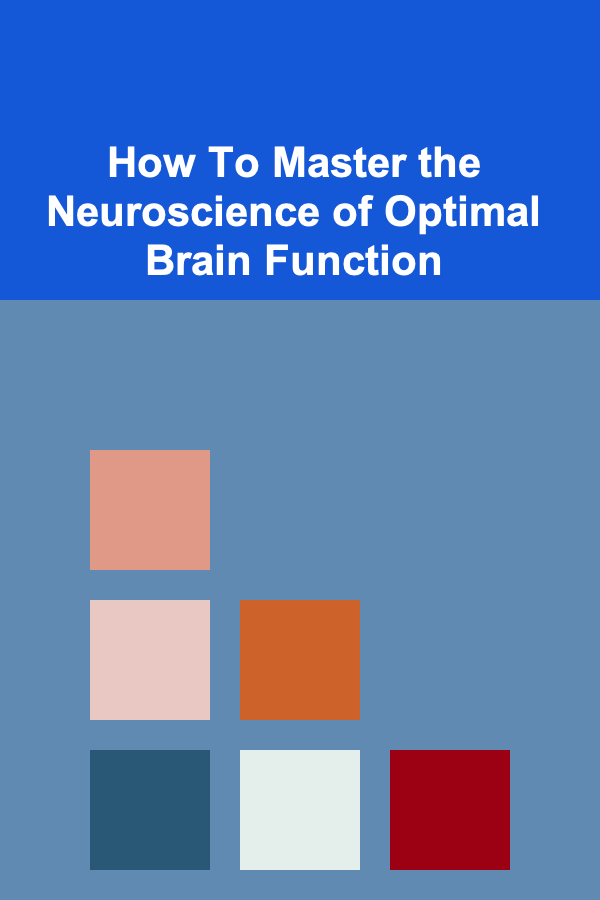
How To Master the Neuroscience of Optimal Brain Function
ebook include PDF & Audio bundle (Micro Guide)
$12.99$5.99
Limited Time Offer! Order within the next:

The human brain, a highly complex organ, is the center of cognition, emotions, memories, and motor functions. It orchestrates the way we think, feel, and behave, adapting to experiences, learning, and environments. As we understand more about the brain's inner workings, we can use this knowledge to improve brain function, enhance cognitive performance, and maintain long-term brain health. Mastering the neuroscience of optimal brain function isn't just about avoiding cognitive decline; it's about achieving peak mental performance.
In this article, we will delve into the fundamental concepts of neuroscience, examine the factors that influence brain health, and provide strategies to enhance cognitive functions like memory, attention, creativity, and emotional regulation.
Understanding Brain Function: The Basics of Neuroscience
Neuroscience is the study of the nervous system, including the brain, spinal cord, and peripheral nerves. The brain, as the most important organ in the nervous system, is made up of around 86 billion neurons (nerve cells) that communicate with each other through electrical and chemical signals. These neurons form networks that control various aspects of behavior, thought, and sensation.
At a basic level, optimal brain function depends on several factors:
- Neuroplasticity: The brain's ability to change and adapt in response to learning and experience.
- Neurogenesis: The process of generating new neurons, which primarily occurs in the hippocampus, a brain region involved in memory and learning.
- Neurotransmitters: Chemical messengers like dopamine, serotonin, and acetylcholine that regulate brain activity and mood.
- Brain Waves: The electrical patterns created by the oscillation of neurons, which correspond to different mental states, including deep sleep, relaxation, or intense focus.
- Cognitive Load: The mental effort required to process information, which affects attention, memory, and overall performance.
When the brain is functioning optimally, these systems work in harmony, promoting clear thinking, emotional stability, and effective problem-solving. However, several lifestyle and environmental factors can either enhance or hinder brain function.
The Role of Nutrition in Brain Health
What we eat has a significant impact on how our brain functions. Nutrients provide the raw materials for neurotransmitter synthesis, cell membrane health, and overall brain activity. A well-balanced diet supports cognitive health and protects the brain from age-related decline.
Key Nutrients for Optimal Brain Function
- Omega-3 Fatty Acids: These essential fats are crucial for building cell membranes and supporting cognitive functions. Found in fatty fish (like salmon and mackerel), flaxseeds, and walnuts, omega-3s are linked to improved memory, focus, and mood regulation.
- Antioxidants: Free radicals can damage brain cells, accelerating aging and cognitive decline. Antioxidants, found in colorful fruits and vegetables like berries, spinach, and kale, protect the brain from oxidative stress and promote brain health.
- B Vitamins: Vitamins such as B6, B12, and folate play a crucial role in neurotransmitter production and cognitive function. Deficiencies in these vitamins are associated with cognitive impairments, mood disorders, and memory loss.
- Vitamin D: This vitamin, produced by the body in response to sunlight, is essential for brain health. Low levels of vitamin D have been linked to depression, cognitive decline, and an increased risk of neurodegenerative diseases like Alzheimer's.
- Amino Acids: Amino acids are the building blocks of proteins and are essential for synthesizing neurotransmitters. The amino acids tyrosine and tryptophan, for instance, are precursors to dopamine and serotonin, respectively, both of which influence mood, focus, and motivation.
A well-balanced diet that includes these essential nutrients can support neurogenesis, enhance cognitive performance, and reduce the risk of mental health issues. However, nutrition alone is not enough to achieve optimal brain function---other factors must also be considered.
Exercise: The Brain's Best Friend
Physical activity is one of the most powerful ways to improve brain function. Exercise not only enhances physical health but also stimulates the brain's ability to function optimally. It increases blood flow to the brain, supports neurogenesis, and boosts the production of neurotrophic factors (proteins that support the survival and growth of neurons).
How Exercise Boosts Brain Function
- Increases Blood Flow and Oxygenation: Exercise promotes circulation, ensuring that the brain receives an adequate supply of oxygen and nutrients. This improves cognitive function, memory, and focus.
- Promotes Neuroplasticity: Regular exercise enhances neuroplasticity, making it easier for the brain to adapt to new experiences and challenges. It encourages the growth of new synaptic connections, which enhances learning and memory.
- Reduces Stress: Exercise is known to reduce levels of cortisol, a hormone released during stress. Chronic stress impairs brain function and is associated with memory deficits and mental health problems.
- Stimulates Neurogenesis: Aerobic exercise, such as running or cycling, has been shown to promote the creation of new neurons in the hippocampus, the brain region most involved in memory and learning.
Studies show that even moderate physical activity can have profound effects on brain function. Engaging in at least 30 minutes of exercise a few times a week can lead to improvements in mood, cognitive performance, and long-term brain health.
Sleep: The Foundation of Brain Health
Sleep plays a crucial role in maintaining brain function. During sleep, the brain undergoes processes that consolidate memories, remove toxins, and restore neural connections. Without proper rest, cognitive function declines, and mental health issues can arise.
How Sleep Affects Brain Function
- Memory Consolidation: During deep sleep, the brain processes and stores information gathered throughout the day. This process enhances long-term memory and learning.
- Cleansing the Brain: The brain's glymphatic system works during sleep to remove waste products, including beta-amyloid plaques, which are associated with Alzheimer's disease. Sleep is crucial for preventing neurodegenerative conditions.
- Mood Regulation: Sleep helps regulate neurotransmitters that control mood. Chronic sleep deprivation has been linked to mood disorders, including depression and anxiety.
- Cognitive Performance: Lack of sleep impairs attention, focus, decision-making, and problem-solving skills. A good night's sleep enhances alertness, creativity, and the ability to learn new information.
To optimize brain function, it's essential to prioritize sleep. Most adults need between 7 to 9 hours of sleep per night, with a consistent sleep schedule that aligns with natural circadian rhythms.
Stress Management: Protecting the Brain from Harmful Effects
While acute stress can be motivating and enhance performance, chronic stress has detrimental effects on the brain. High levels of cortisol, a stress hormone, can interfere with memory, emotional regulation, and overall cognitive function.
How Stress Affects the Brain
- Hinders Memory: Chronic stress damages the hippocampus, the brain region responsible for forming and storing memories. This can lead to difficulty concentrating, remembering details, and retaining new information.
- Impairs Decision-Making: Prolonged stress affects the prefrontal cortex, the brain region involved in decision-making, planning, and impulse control. This can lead to impulsive decisions and poor judgment.
- Promotes Anxiety and Depression: Long-term stress is a risk factor for mental health disorders, including anxiety and depression. Elevated cortisol levels disrupt the balance of neurotransmitters like serotonin and dopamine, leading to mood imbalances.
To protect the brain from the harmful effects of stress, it's essential to practice effective stress-management techniques. These include mindfulness, meditation, deep-breathing exercises, and physical activities like yoga.
Mental Stimulation: Keep the Brain Active
Like the body, the brain benefits from exercise. Mental stimulation encourages the growth of new synaptic connections and supports neuroplasticity. Engaging in activities that challenge the brain is essential for maintaining cognitive function and preventing mental decline.
Ways to Stimulate the Brain
- Learning New Skills: Continuously learning new things keeps the brain engaged and sharp. Whether it's picking up a new language, playing a musical instrument, or mastering a new hobby, learning challenges the brain and promotes cognitive growth.
- Problem-Solving and Puzzles: Activities like crossword puzzles, Sudoku, and logic games enhance cognitive abilities, improve memory, and increase mental agility.
- Social Interaction: Engaging in meaningful conversations and social activities stimulates the brain, improving mood and cognitive function. Social interaction is essential for emotional well-being and cognitive health.
By incorporating mental challenges into daily life, you can support brain health and ensure that your brain remains sharp as you age.
Conclusion: Mastering Brain Function for Optimal Performance
The brain is the most important organ in the human body, influencing every aspect of our lives. By understanding the neuroscience of brain function, we can make informed decisions about lifestyle choices that promote cognitive health and enhance mental performance. Nutrition, exercise, sleep, stress management, and mental stimulation all play crucial roles in optimizing brain function.
Mastering the neuroscience of optimal brain function is an ongoing process that requires awareness, commitment, and consistent effort. By incorporating these strategies into your daily routine, you can improve your cognitive abilities, protect your brain from age-related decline, and achieve peak mental performance. Your brain is capable of remarkable feats---it's time to unlock its full potential.

10 Effective Tips for Saving Money on Home Security
Read More
How to Plan a Pool Party with Fun Activities for All Ages
Read More
How to Price Your Cleaning Services for Maximum Profit
Read More
How to Transform Your Front Porch with Holiday Decorations
Read More
How To Understand the Philosophy of Death
Read More
How to Build a Profitable Coaching Business
Read MoreOther Products

10 Effective Tips for Saving Money on Home Security
Read More
How to Plan a Pool Party with Fun Activities for All Ages
Read More
How to Price Your Cleaning Services for Maximum Profit
Read More
How to Transform Your Front Porch with Holiday Decorations
Read More
How To Understand the Philosophy of Death
Read More